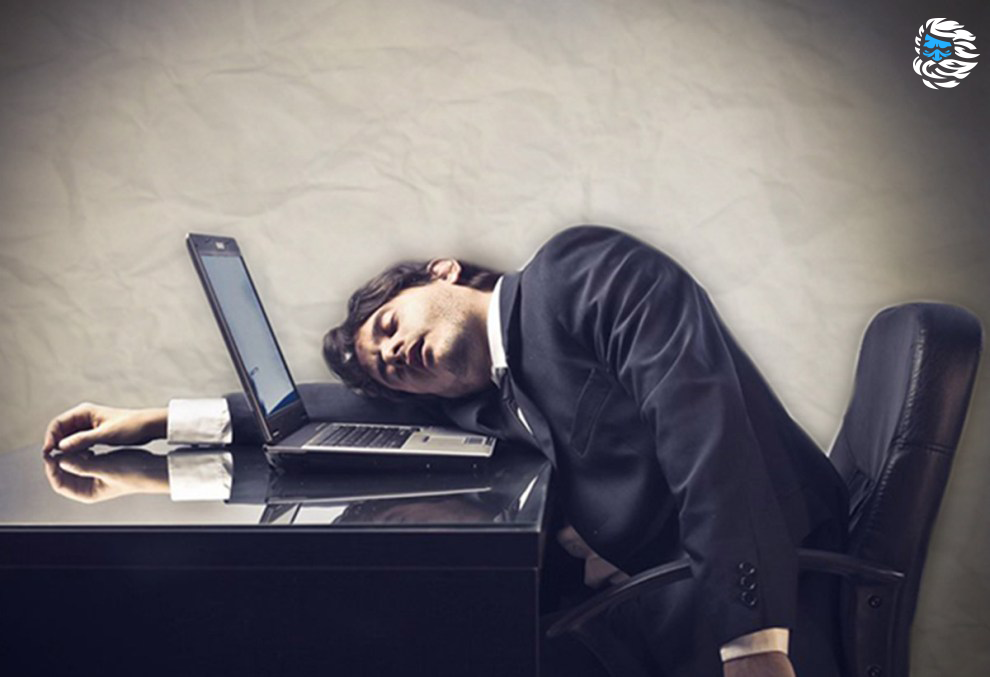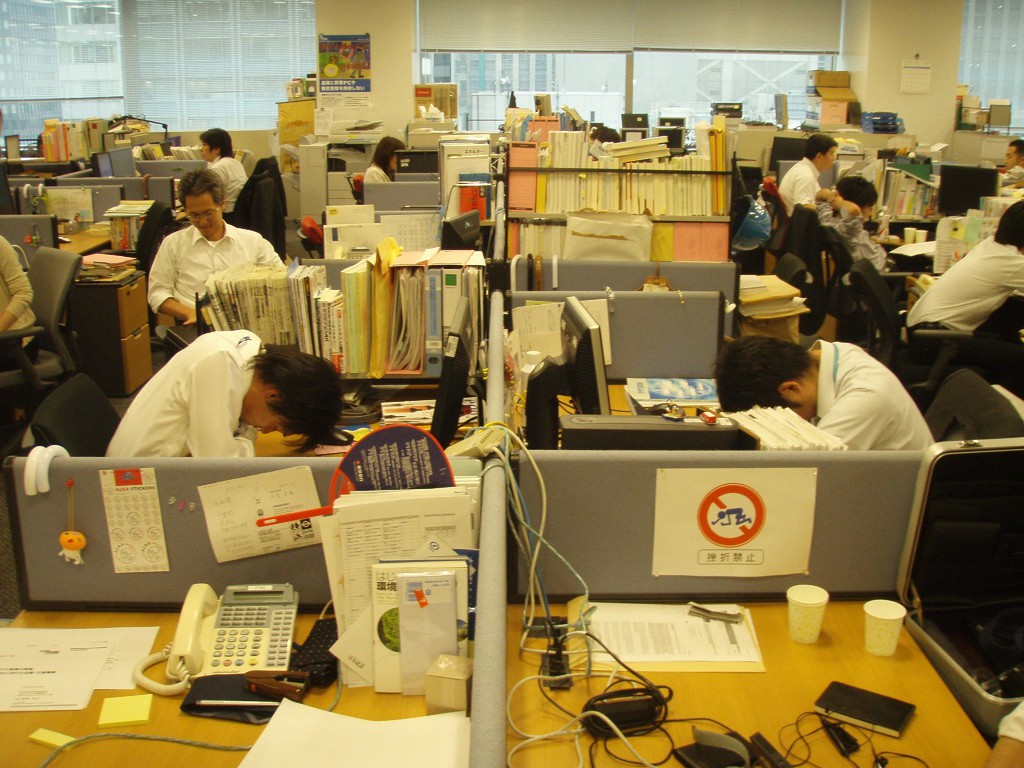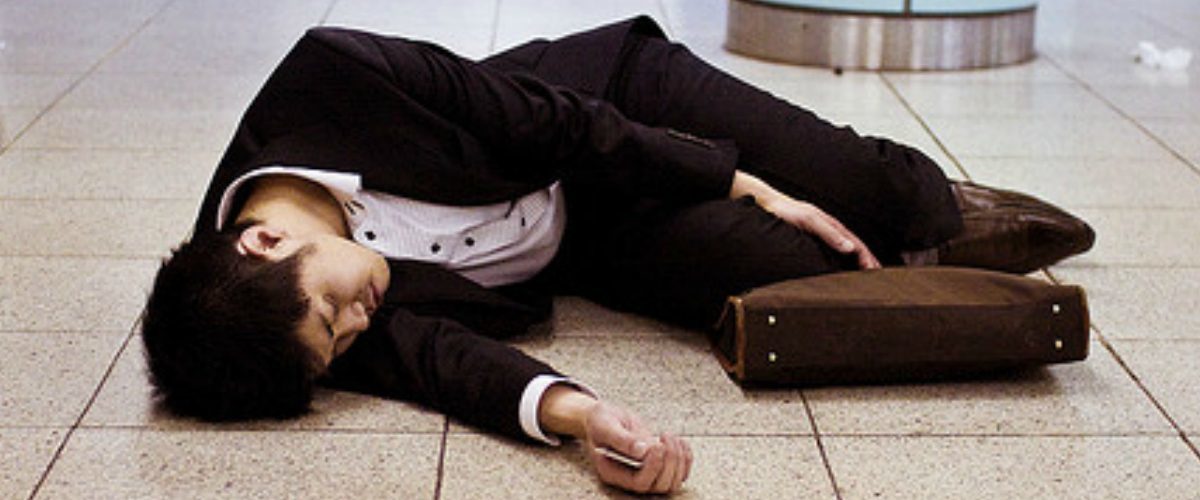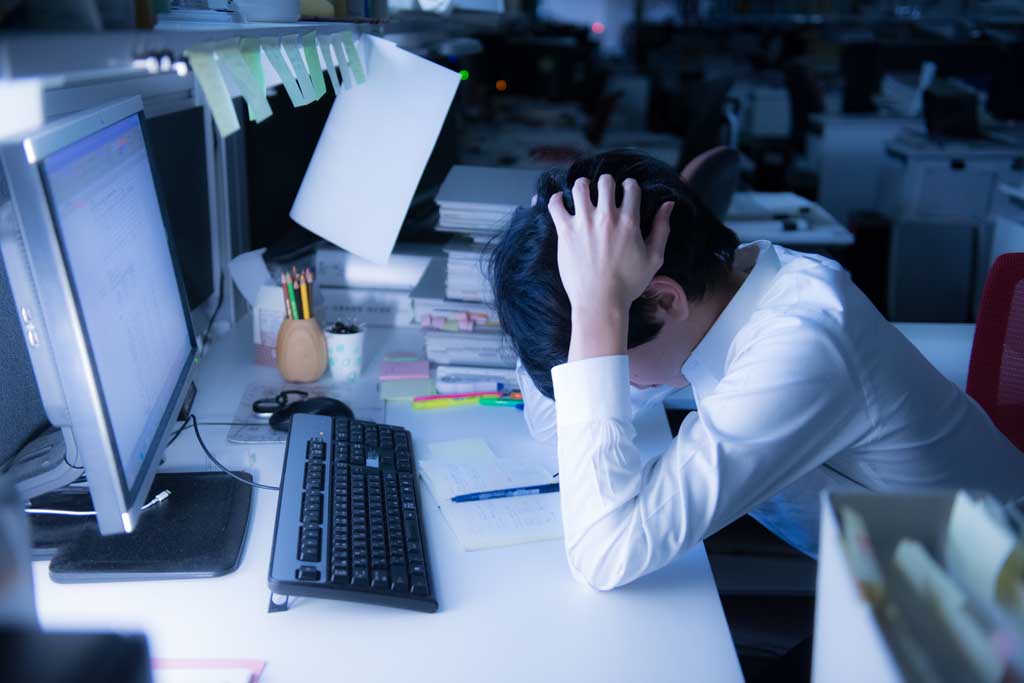
They say that there are several things in the world that are gradually killing representatives of the species homo sapiens - this is nicotine, alcohol ... and processing. Indeed, our wise ancestors came up with the proverb “horses die from work” for a reason: a reasonable person can move horses from work, especially if he has too much of this work. The Japanese even came up with a special term for this - "karoshi", which means death from excessively high professional loads. And this phenomenon in the land of the Rising Sun is by no means rare.
The World Health Organization has conducted a study that shows that processing kills 745,000 people every year around the world. The largest number of deaths occurs in the regions of Southeast Asia, and the WHO experts consider strokes and heart problems the most common culprits of death. The root cause of the death of people is banal overwork.
This problem is by no means new. The karoshi phenomenon was first discussed in Japan back in 1969, after the death of a 29-year-old courier from a local newspaper from a heart attack, but the term itself came into use a dozen years later. Around the same time, serious research began on the deaths of employees of various companies due to excessive workload. The interested party was, first of all, insurance companies. In the 1980s, the Japanese even set up a karoshi hotline to give workers the opportunity to complain about the harsh working conditions. True, in the end it turned out that most often it was not the citizens suffering from overwork themselves who called there, but their wives, worried about the health of their husbands.
How much do you need to work hard to be guaranteed to bend in the shortest possible time? WHO experts believe that working hours of 55 or more hours per week increases the risk of stroke by 35%, and the likelihood of receiving a bonus in the form of chronic cardiovascular diseases increases in this case by 17%. The International Labor Organization at the UN (International Labor Organization) complements this sad mathematics with its own data: the majority of deaths from overwork are middle-aged men, while death often occurred much later than the period of increased stress - sometimes after decades. In other words, over-processing has delayed negative consequences. While a person is young, the body can tolerate increased loads relatively easily,but the accumulated nervous tension and lack of sleep cannot be reflected later - when you do not expect it at all.

It's not just office workers who experience chronic overwork. It is a faithful companion for freelancers, who often work more than eight hours a day, and even on an irregularly complex schedule. And if the former can always blame the exploiter-employer for their troubles, then the latter, in general, have no one to shift the responsibility for the undermined health. So the desire for relative freedom and lack of control from the authorities can ultimately lead to the loss of this very control over their own lives. There are many examples of this.
During the period of the pandemic and the massive shift of employees of many companies (and IT corporations - in particular) to telecommuting, workloads have increased significantly. I specifically interviewed several of my acquaintances who previously worked in the office, and who moved home with the beginning of the coronavirus epic, and asked them to compare their own schedule before and after. Four out of six reported that work on a remote location takes much longer than an office, one said the workload was about the same, and another one began to work less - however, this comrade did not particularly strain before the "zombie apocalypse" It is, of course, impossible to draw conclusions on the basis of such an ultra-small sample, but the trend is obvious: when the working day is not standardized, it is much more difficult to control the workload, and overtime occurs more often. Freelancers, I think, completely agree with me.

The most obvious consequences of increased workload are stress, fatigue, insomnia and chronic fatigue syndrome, which often turns into prolonged depression. Often this complex of symptoms is called professional burnout, but often the problem lies much deeper. Drowsiness, depression and inability to concentrate on work sometimes provoke the abuse of energy drinks, coffee, tobacco, and alcohol. All this, in turn, gradually undermines the already frail health. The circle is closed.
It is appropriate here to tell the story of my friend, a thirty-two-year-old freelance programmer, which happened to him in June 2019. In his own words, work throughout the year is distributed extremely unevenly for him: there are periods of relative calm, and sometimes you have to stay in debugging for days to complete the project on time. At such moments, you have to sleep in fits and starts, while something is being assembled or tested, and at the end of the emergency, the “waste” can last a week or more - during this period it is generally incapable of productive work. On that unfortunate night, the relatives were at the dacha. My friend woke up in the morning from an acute compressive pain in his chest, aggravated by breathing. Having eaten off all the painkillers in the first-aid kit and finished off the remnants of grandmother's "Corvalol", he tried to fall asleep - it did not work. By dawn the pain had subsidedbut from time to time it returned, now subsiding, now rolling in waves. By the afternoon, he nevertheless decided to go to a nearby paid clinic in order to quickly get a cardiogram. The doctor, having studied the tape, called the manager, and for some time they thoughtfully examined the zigzags of the recorder together, after which they inquired about his well-being and ran away somewhere. “Well, shall I go?” My friend asked the nurse who remained in the office when he got tired of lying on the couch with a naked torso. “Where will you go with a heart attack?” She wondered. - "We have already called an ambulance for you, wait!" So my friend learned all the charms of the cardiology department of one of the domestic hospitals. Now he eats the pills prescribed by doctors, does not drink anything stronger than kefir, which he walks in Scandinavian style with ski poles, and tries to observe the daily regimen.
The Office for National Statistics of Great Britain has calculated that with the onset of the coronavirus pandemic, residents of Foggy Albion who switched to telecommuting began to work an average of 3.6 hours more than before in offices. According to my personal feelings on a home "free" schedule, the work week increases by at least 6 hours compared to the period when I worked in the office of a large international software company and could afford to simply turn off the monitor at the end of an eight-hour working day and stomp with a clear conscience home. Many of my colleagues, who have replaced a cozy office with a stormy ocean of self-employment, have similar feelings.

However, processing for 3-6 or even 8 hours a week is nothing compared to what happens in some eastern countries, and there it is considered a variant of the norm. Blogger Alexei Raisikh, who has lived in China for a long time, author of the China Inside Out telegram channel, writes:
« ? . — . , . , . , , , «». 21:00 — , , . — . 9 9 . , , . , 6 . — ».
In Chinese, death from excessive workloads is called “ voices, ” and it is also a problem that, however, is less talked about than in Japan. On average, Chinese IT and Internet companies have a 72-hour workweek (9am to 9pm from Monday to Saturday), but many businesses pay their employees for taxi and food if they work overtime. It is perhaps really difficult not to accumulate with such a schedule, but the Chinese have adapted to this and do not consider such a regime to be anything unusual.
In South Korea, death from overwork is also familiar to everyone - here this phenomenon is called " quarosa". In this country, the work schedule is as busy as in other countries of Asia - 52 hours a week, but until 2018 it was 68 hours and was considered the longest in the region.
In the same Japan, where the term "karoshi" was coined, back in 1988 it was calculated that the working week in the commercial sector averages 60 hours. They began to actively fight against this phenomenon, but this did not help: in 2001, 143 Japanese died from overwork, in other years this figure was less, but almost never dropped to zero. According to Wikipedia, “ Every fifth Japanese male between the ages of 30 and 50 works more than 60 hours a week, excluding unaccounted time and work communication, and on average he has no more than half an hour a day to communicate with his family.". Large corporations are trying to break these traditions: for example, Toyota has a special automatic mailing list, which reminds employees every evening at 19 o'clock that the work day is over. At Nissan, office staff wishing to work more than 8 hours a day are offered a partially remote work schedule.

In European countries, as in Russia, labor laws limit the maximum amount of working time. One of the most humane schedules is adopted in France: there the working week lasts 35 hours. In Denmark and Norway, a five-day week is adopted, but the working day lasts at least 6.5 hours, thus 32.5 hours per week. In the Netherlands, the minimum workload is legally limited to thirty hours (with the option to have up to three days off per week), but very few seem to comply with this minimum. Most other European countries, like Russia, have a 40-hour work week. But that is if you work for your uncle. If you work for yourself, then you can quite repeat the feat of the Japanese and Chinese, who plow until they are carried forward with their felt boots.
In order not to "get sick" ahead of time, I personally adopted a few simple rules for myself, allowing you to alternate workload and rest. It is not always possible to comply with them, but I try. Here they are:
- At 20.00 I turn off my work phone. Whatever happened there: even a fire, even a flood, even a meteorite fallout, customers and clients will wait until the next morning.
- The fourth commandment in Genesis is: "Honor the sabbath day." I also respect Sunday. Weekends - for family, rest and sleep, work is done in the forest.
- Vacation. At least two weeks a year. Without a phone, laptop and tablet, preferably somewhere on the sea or in the mountains, as far as possible in the current conditions of ubiquitous restrictions. From time to time, you need to forget about work and completely switch the brain to vacation mode.
- Sport. If you managed to finish work at 8 pm, it is better to ride a bike to the park than stick it in the insta until evening. In winter, the great can be replaced with skis and a swimming pool.
- Sleep at least 8 hours a day. You need to get up early - go to bed earlier. I still won't be able to work productively if I don't get enough sleep, so taking a nap for an hour in the afternoon is also a good idea, so that later I can tackle current tasks with a fresh mind.
- No more than 4 cups of coffee a day. Once upon a time in the office of the IT company where I worked, the bosses installed free coffee machines. I started drinking coffee in buckets and set my heart down, getting pressure problems on the load. Everything is good in moderation.
For me personally, these simple principles still help me to stay in the saddle. What ways do you use to save yourself from excessive loads?
Cloud servers from Macleod are fast and secure.
Register using the link above or by clicking on the banner and get a 10% discount for the first month of renting a server of any configuration!
